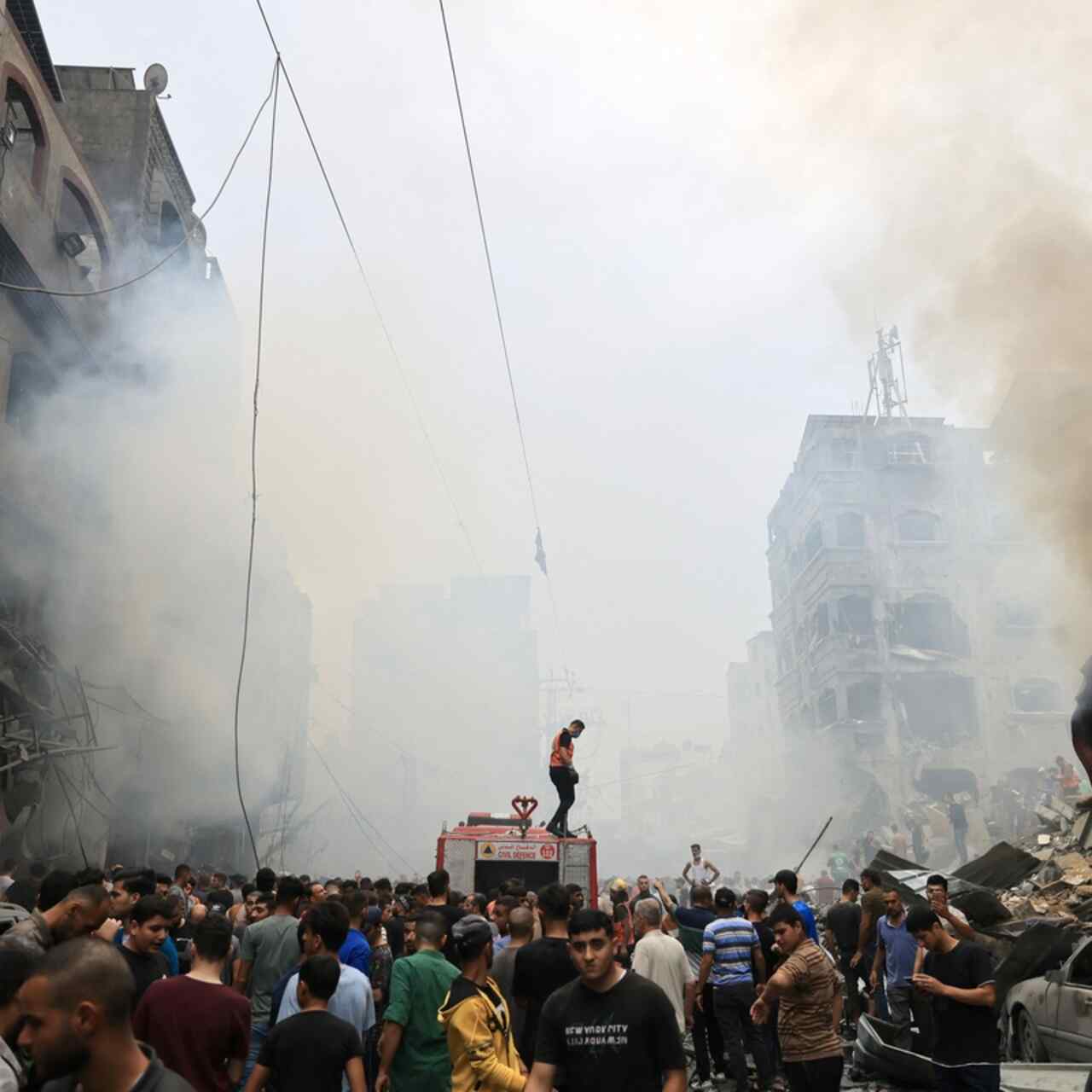
Crisis in Gaza: What is happening?
The ongoing conflict has devastated the civilian population of Gaza.

The ongoing conflict has devastated the civilian population of Gaza.
On October 7, 2023, Hamas and other Palestinian armed groups orchestrated a deadly attack on Israel. The horrific attack killed 1,200 people, with over 200 hostages seized and over 100 still unaccounted for. Israeli forces began airstrikes and ground operations in response.
The ongoing conflict has devastated the civilian population of Gaza. Seventy-five percent of the population of Gaza has been displaced, most multiple times, and the entire population is in need of humanitarian assistance. The ongoing conflict, bombardment and blockade have led to catastrophic humanitarian suffering for more than 2 million Palestinians—half of them children—who are now without clean water, food and vital medical services.
According to the United Nations Office for Humanitarian Affairs, which bases its figures on the Gazan Ministry of Health statistics, there have been over 37,000 fatalities of Palestinians.
Hamas has reportedly mixed military personnel amongst facilities with civilians.
The entire population of Gaza is facing acute insecurity as they are caught up in this conflict.
Israeli bombardment and exchange of fire has damaged or destroyed over 60% of Gaza’s housing.
Persistent restrictions on the flow of humanitarian aid into and around Gaza are driving a desperate shortage of food, fuel, medicine, equipment and humanitarian staff in Gaza. Hundreds of thousands of people in northern Gaza are largely cut off from aid entirely. An increased amount of aid made it into Gaza during March and April 2024, but those gains have been lost since operations commenced in Rafah, a border crossing that has served as the epicenter of the humanitarian response.
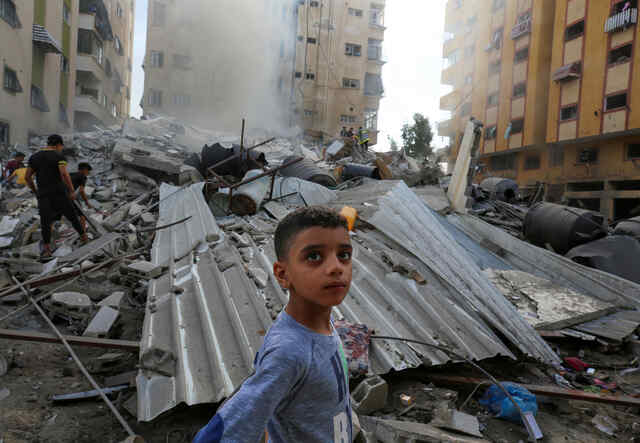
Insecurity caused by the fighting also makes it difficult for humanitarian agencies to safely get the aid to affected populations. The danger extends to humanitarian workers. More than 260 aid workers have been killed, over 190 of whom worked for the United Nations.
There are also increasing reports of looting and violence around aid delivery.
The IRC is calling for an immediate ceasefire as envisaged by the recent UN Security Council Resolution. From a humanitarian perspective, a ceasefire is the only way to fully protect Palestinian lives, secure the release of hostages taken from Israel on October 7th, and safely scale-up humanitarian assistance and service delivery.
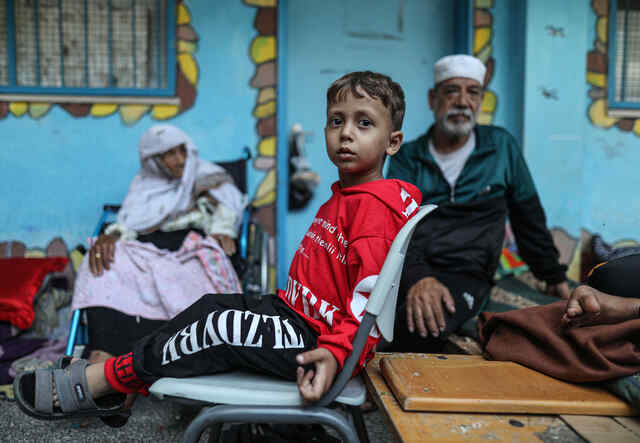
The only way to fully address the aid delivery challenges in Gaza is a ceasefire paired with a comprehensive “humanitarian reset.” This demands a clear, immediate and accountable plan to:
All parties must abide by international humanitarian law. They should immediately take steps to protect civilians and uphold international law. Hamas and other Palestinian groups must release hostages and refrain from launching military attacks from within, or close to, civilian infrastructure—especially hospitals. All parties must stop using explosive weapons with wide-area effects in populated areas. Israel must ensure all military operations across Gaza apply the fundamental principles of distinction, proportionality and precaution.
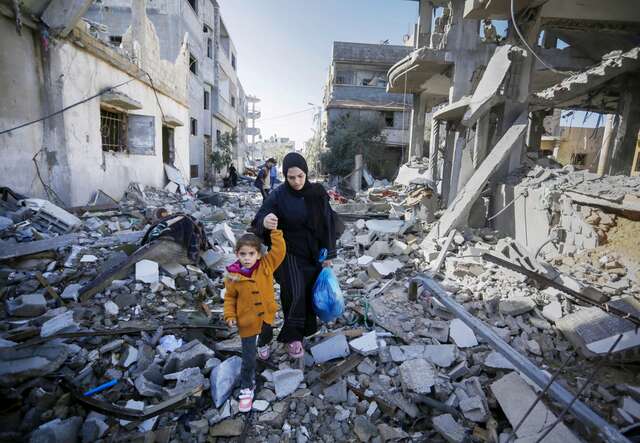
The International Rescue Committee (IRC) and partners in Gaza are delivering emergency and life-saving medical care, including direct medical care, in Gaza’s few remaining operational hospitals. In addition to distributing medical supplies and pharmaceuticals, the IRC is working with partners to provide food parcels, psychosocial support, protection, and early childhood development programs, including in Gaza's many shelters. The IRC is also starting up direct programming in Nutrition, Water and Sanitation, and Protection services.
The IRC’s response in Gaza draws on our global experience and expertise in emergency response, as well as our longstanding presence in the region. Local partners have been leading the response in Gaza and we are supporting their objectives through financial, technical and operational support.
The IRC plans to achieve much greater scale in our programming in Gaza as soon as a ceasefire is in place. The IRC will aim to work directly and through partners to provide health care, nutrition, water, sanitation and hygiene and protection particularly focused on separated children.
Prior to October 2023 there were 36 hospitals in Gaza. Of those 19 are no longer functional and only 17 are partially functional. Those few remaining facilities are completely overwhelmed and lack health care personnel and basic supplies. Patients are dying from infections as hospitals are at breaking point due to the skyrocketing demand for medical services.
“These health care facilities are not built for mass casualty. And in fact, no hospital in the world is built for this kind of sustained severity of mass casualty, nor could any be able to sustain it,” says IRC’s senior emergency health advisor Dr. Seema Jilani, who deployed to Al Aqsa Hospital in Middle Gaza as a member of the IRC’s emergency medical team.
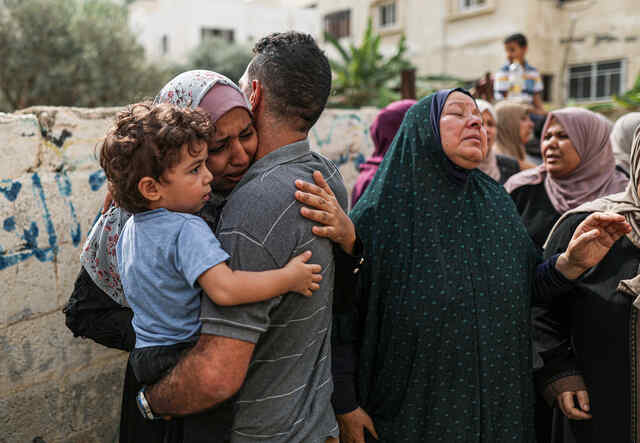
Over half of the water and sanitation facilities in Gaza have been destroyed, leading to an accumulation of 340,000 tons of solid waste. Lack of clean water and sanitation services risks the spread of preventable diseases.
The IRC and our partner have deployed eight successive Emergency Medical Teams to provide emergency and life-saving medical care, including direct medical care at hospitals, and the distribution of medical supplies and pharmaceuticals. The team, composed of trauma doctors, surgeons, pediatricians and disaster experts, are offering surge and relief support to hospitals and providing life-saving medical care to injured Palestinians. To date, our EMTs have delivered at least 384 surgeries and 1,243 consultations, including minor procedures and critical care.
The IRC has procured and delivered 46 metric tons of pharmaceuticals and medical supplies which the IRC and our partners are distributing to support health facilities across Gaza. These include pediatric and psychotropic medicines as well as trauma supplies and are based on needs identified and coordinated across health actors working in Gaza.
We have partnered with Palestinian NGO, Juzoor for Health and Social Development, to address the health and mental health needs of those displaced and to provide access to basic services for children and families. Together, our three mobile health teams have provided more than 10,000 patient consultations in northern Gaza. The teams have been providing health services in three shelter clusters in northern Gaza since February. In the first week of March alone, these clinics served almost 7,000 patients and we expect to reach more than 30,000 in the following months.
Even before the increase in hostilities, at least half a million children in Gaza needed mental health and psychosocial support. Now, every child, parent and caregiver in Gaza has experienced profoundly distressing events and trauma, characterized by extensive destruction and displacement.
In partnership with Anera, the IRC is working to provide essential mental health and psychosocial support to Palestinian children. We are utilizing a comprehensive approach that prioritizes the needs of children between the ages of 4 and 18, to implement therapeutic activities including play, art therapy and life skills training. Our activities are designed to empower children to cope with their experiences, express themselves creatively and develop essential life skills for the future, thereby promoting healing, resilience and emotional wellbeing. By fostering a safe and supportive environment, we aim to mitigate the long-term impact of the crisis in Gaza and have started providing psychosocial support services for 9,000 children between 4 and 11 years old and informal literacy and numeracy sessions for 1,200 children, targeting people sheltering in schools.
The IRC has also partnered with Nafs and begun delivering mental health and psychosocial service (MHPSS) activities through six mobile community centers—three in Gaza and three in the West Bank. Our partnership with Nafs is expected to deliver support to 5,000 children within the next few months.
Farmers in Gaza are now unable to produce food. An estimated 80% of cropland has been destroyed in some areas while 70% of livestock providing meat or dairy products have been killed.
Severe shortages of food and clean water mean that the entirety of Gaza’s population is facing crisis levels of food insecurity and imminent famine. Recent studies using the International Phase Classification for food insecurity found the whole population at crisis levels and nearly 500, 000 people at catastrophic levels.
Although lack of humanitarian access is likely obscuring the full picture of hunger in Gaza, the UN has reported that children are already dying of hunger.
Over 50% of households report no food at home, with more than 20% going entire days without eating.
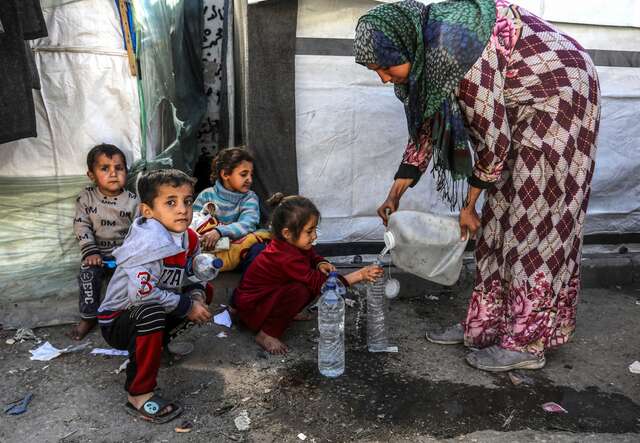
The International Rescue Committee (IRC) and Welfare Association (Taawon) partnered to combat the severe hunger affecting displaced families in Rafah, southern Gaza, where over one million people have been displaced and have sought refuge in what is considered Gaza’s last haven. Together, we delivered fresh food parcels to approximately 3,500 families between January and February 2024.
The IRC is working with partners to deliver critical emergency aid to families in Gaza and conflict zones around the world. Donate now to support our critical work.
We are on the frontlines providing critical aid to crisis-affected people in more than 40 countries, including places on the 2024 Emergency Watchlist. Read more about the top 10 crises the world can’t ignore in 2024.